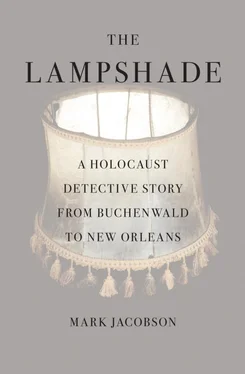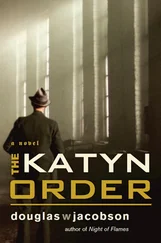The address I had for Duke turned out to be a small apartment house a few blocks from the picturesque but largely deserted (the ski season was winding down) main drag. The eight buzzers all had German names next to them and random bell pushing produced no result. Nearby an older man was playing Frisbee with a blond-haired boy about nine. “Are you looking for the American?” the old man asked. “He is there.” With that the old man unlocked the building’s door, walked up the wooden staircase, and knocked on a door.
A moment later there was Duke, coming down the staircase in a lime-green satin bathrobe, tan puffy bedroom slippers, and a bathing cap on his head. The skin on his face was red and curling; it seemed as if I’d caught him in the middle of a chemical peel.
“David Duke,” I said.
“No,” he said. “My name is Ernest Duke.” Ernest is Duke’s middle name and he sometimes signed articles as “Ernest Duke.” It was not clear if Duke preferred to be addressed as Ernest or whether he was pretending to be a wholly other person.
After a pause, Duke abandoned this tack and asked me who I was and how I’d found him. I said I was a reporter, I’d been given his address by some people in Vienna, and since I was in the neighborhood, I thought I’d drop in. I was writing a story on Katrina and its aftermath, and since he’d once been a hair’s breadth from occupying the Louisiana statehouse, I thought it might be interesting to hear what he had to say about the storm, from the leadership point of view. All of which was completely true, more or less.
I handed him my New York magazine card, which Duke looked over. “New York, huh?” he said. Then, he focused on my name in what appeared to be three distinct, escalating takes: Jew… Jew… JEW.
“Who gave you my address?” Duke asked again, sharper than before.
“I don’t have an ax to grind. I just want to hear views,” I offered.
“Okay,” Duke said, putting my card in the pocket of his bathrobe. “I’ll talk to you. Go down to the café at the corner. Wait there. Let me get dressed. Be a few minutes.”
The café was closed for the season, so I sat down at a metal picnic table outside and surveyed the scenery, which was copious, with mountain peaks in three directions. Small packs of bicyclists rode the sloping curve in the road, tapered spandex butts in the air. Austria. For years I couldn’t think of the place without recalling the line attributed to Arnold Schwarzenegger during his bodybuilding days: “The Germans are nothing without an Austrian to lead them.”
It was taking Duke a while to come down. I figured he was on the Internet trying to find out who I really was. The wait gave me a chance to mull over the time I’d attended a seminar for middle and high school teachers back in New Orleans on how to present Holocaust and civil rights curricula to students from backgrounds not in tune with the current thinking on these topics. The seminar leader, the estimable Plater Robinson, had invited some members of the small New Orleans Holocaust survivor community, including Anne Levy, then in her seventies but still in the Garden District antique business and very spry. Separated from her family as a young girl, and having grown up as a street urchin in the Warsaw Ghetto, Levy was very upset when David Duke began running for office. “It was like they’d come after me again,” she said when we talked.
Levy described coming face-to-face with Duke. It was during Duke’s term in the legislature; Levy was in Baton Rouge to see an exhibit about the Holocaust. “I was looking at some photos,” she recalled. “Then I see, right beside me, David Duke. The way he was standing there, his hands clasped behind his back, it was exactly the way I remembered the Germans standing in the Ghetto, when they made us line up and looked us over. Sometimes they’d pull people out of line. You never saw them again.
“‘What are you doing here?’ I yelled at Duke. He didn’t respond. It was like I wasn’t there at all. I said it again, ‘What are you doing here? Why do you want to look at pictures of something you say never happened?’
“Finally he looks at me and says, ‘I didn’t say it never happened. I said it was exaggerated .’ I guess I was yelling at him, because some cameramen started coming over. Duke started walking away, faster and faster. He didn’t want to have his picture taken with me. But I wouldn’t let him go. I started running after him. The closer I got, the faster he went. Here I am, this five-foot-tall Jewish grandma and David Duke is running away from me. They got shots of it; it was in all the papers.”
Duke was walking toward the café now. He’d changed into tight-fitting blue jeans neatly cuffed to show off a high-end pair of hiking boots. A partly zipped buckskin jacket covered a striped Ralph Lauren shirt. His blond hair, haphazardly dyed, sat on top of his head like a half-fallen soufflé. Now nearly sixty, Duke, his teeth whiter than buffed Chiclets, seemed intent on presenting the aspect of a man twenty years younger.
Duke said he didn’t know how much time he had. Even though his position in “the cause” had shifted over the years to “more of an elder statesman, an adviser, a historian and philosopher, rather than the young Turk I used to be,” he was still very busy. He wrote columns for his website, DavidDuke.com, and did a radio show three times a week with Don Black, who runs the “white rights” Stormfront site. There was also the matter of putting the finishing touches on his new book, Jewish Supremacism: My Awakening to the Jewish Question, which he’d begun as part of the Ph.D. he got in history from the Interregional Academy of Personnel Management in the Ukraine.
Beyond that, there was a chance of a great sunset and Duke wanted to photograph it. “I’ve always been an amateur shutterbug,” he said, but since moving to the Alps he’d become “inspired as never before.” He was currently displaying his pictures, many of them Obersalzberg landscapes, at DavidDuke.com, where framed 20 × 28—inch prints were available for sale, each one personally autographed in “a special gold ink.”
Duke took a deep gulp of Alpine air, which he said was “the world’s finest.” There was simply something about “being around the mountains” that brought out the best in him. “Up here you feel free… You wouldn’t have anything like Katrina up here, that’s for sure.”
Katrina was a “cataclysm of race and neglect,” Duke said. “I watched those images and was heartsick to see what has happened to our country. It was like Uganda in New Orleans. As if a lovely city had been thrown back to the Stone Age. It was a massive failure of government on every level, but it was also an even more massive failure of people. Face it, black people were out of control in those streets. I have a lot of good friends on the NOPD. The stories they’ve told me you won’t believe. The public will never know the half of it because it is suppressed. The scene in the Convention Center and the Superdome was way, way worse than anyone knows. There were dozens of rapes. People were just defecating right there in their seats. Right where they sat!
“You ask me what I would have done if I was governor during the storm? What could you do, short of letting the police and military have their way with the criminals, but is that what you really want, all those people shot down in the streets? You can’t give people like Nagin and Bush a free pass, but New Orleans was so far gone before Katrina that the disaster was inevitable. It might be a dead city now but it has been dying for years. Look at the basic structures, look at the schools. Everyone says the public schools in New Orleans are bad for black kids, but they’re hell for white kids. I went to a good segregated public school in New Orleans. I got a good education. Now a white kid would be lucky to make it through a day.
Читать дальше












